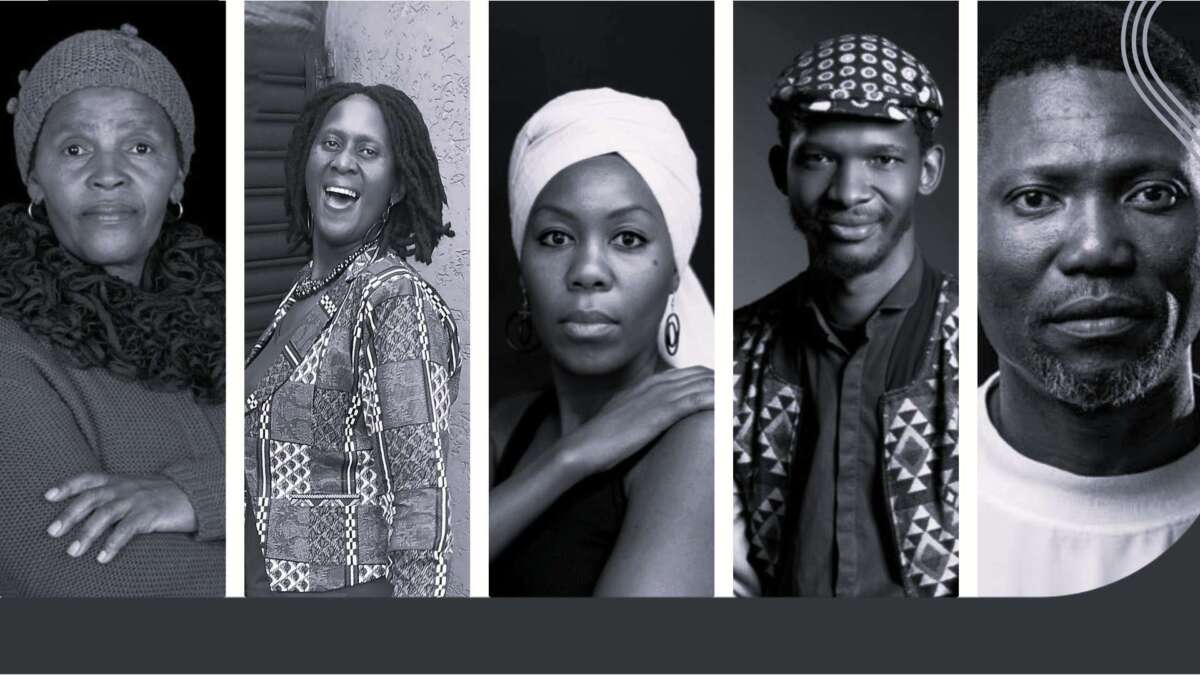

The Body as Archive: Women as Repository of History and Memory
August 21, 2024 @ 12:00 pm - 2:00 pm
In reflecting on the Truth and Reconciliation Commission (TRC) and on 30 years of democracy, we focus on the stories of Nomonde Calata and Seipati Mlangeni, widows of Bheki Mlangeni and Fort Calata who were murdered by apartheid security forces. Their testimonies at the TRC, and their continuing journeys with this traumatic past open up questions about the relationship between trauma, history, and the body as archive. Their presence and iconic TRC cries will open a dialogue about women’s bodies as archives of trauma, history, and collective memory. For this conversation, Nomonde Calata and Seipati Mlangeni will be in conversation with Sisonke Msimang and Prof Tamar Garb.
Dance and Music as a Political Voice of Repair
In the evening session, Gregory Maqoma, South Africa’s greatest dancer-choreographer, and Mandla Mlangeni, award-winning trumpeter, composer and bandleader, will engage with and respond to the earlier conversation in dialogue with the panel.
Date: Wednesday, August 21
Time: 17:00-19:00
Venue: Stellenbosch University Museum
To register for both events Click Here
Nomonde Calata
Nomonde Calata has lived through and survived the brutal and inhuman apartheid regime in South Africa. Her husband, Fort Calata, an economics teacher at a high school advocating non-violent resistance, did not. Fort was one of the so-called “Cradock Four” who were tortured and brutally murdered by the apartheid government security forces on June 27, 1985. Born on April 10, 1959, in e’Sdikidini (Red Location), Cradock, Eastern Cape, she is the eighth of eleven children born to William and Vivian Maclean. In April 1984, Nomonde was dismissed from her job as a food service sssistant at Cradock Hospital for wearing a Free Mandela t-shirt. Later that year, Fort was detained and dismissed from his teaching position for fighting for equal rights. Nomonde is still very active in her community spearheading numerous community development programs aimed at addressing social ill.
To access Nomonde’s “TRC testimonies” you can click HERE
Seipati Mlangeni
Seipati Thembi Mlangeni is a dedicated advocate for justice and community development, known for her resilience, compassion, and unwavering dedication to social justice. As the wife of the late Bheki Mlangeni, a prominent ANC lawyer, Seipati has been a steadfast supporter of the struggle for equality and human rights. At 57 years old, she has deep roots in Soweto, where she was born and raised by her maternal grandparents. During the 1976 uprisings, Seipati relocated to KwaZulu-Natal for four years to pursue her primary education before returning to complete her secondary education in Soweto. She is a devoted mother and extends her nurturing spirit to her siblings’ children. Widowed and currently working for a corporate company, Seipati balances her professional life with personal interests. A balance of extroversion and introversion defines Seipati’s personality. While a back problem has curtailed her passion for running, she finds joy in gardening, painting, and watching fashion shows. Her life story is one of resilience, dedication, and multifaceted interests, continuing to inspire those around her.
To access Seipati’s “TRC testimonies” you can click HERE
Gregory Maqoma began his formal dance training in 1990 at Moving Into Dance (MID) and has since become an internationally renowned dancer, choreographer, teacher, director, and scriptwriter. In 1999, he founded Vuyani Dance Theatre (VDT) while on a scholarship at the Performing Arts Research and Training School (PARTS) in Belgium. Maqoma served as Associate Artistic Director of MID (2002-2006) and the FNB Dance Umbrella Festival (2010), and as Artistic Director of the Afro-Vibes Festival (2004-2010). He has taught at universities across Africa, the USA, and Europe, including the University of California, Bates College, and the University of Cape Town. Maqoma has collaborated with notable artists like Faustin Linyekula and William Kentridge, and received numerous awards, including the Chevalier de l’Ordre des Arts et des Lettres (2017) and the Fleur De Cap Encore Award (2024).
Sisonke is the author of two books (Always Another Country and The Resurrection of Winnie Mandela: A biography of survival) and the columnist behind Ms Understanding, which tackles race and racism in the Guardian on a bi-weekly basis. She is also a long-term collaborator with the Centre for Stories where I head up storytelling and offer a bespoke training and coaching service for leaders interested in improving their storytelling skills.
Tamar Garb Durning Lawrence Professor in History of Art, University College London. She has published widely on questions of gender, sexuality, the woman artist and the body. Her recent work addresses post-apartheid culture and art as well as the history of photographic practices in Africa. Key publications include Bodies of Modernity: Figure and Flesh in fin de siècle France, (1996), The Painted Face, Portraits of Women in France 1814 -1914 (2007). The Body in Time: Figures of Femininity in Late NineteenthCentury France; The Painted Face, Portraits of Women in France 1814– 1914 (Yale University Press, 2007); and Sisters of the Brush: Women’s Artistic Culture in Late Nineteenth Century Paris (Yale University Press, 1994). Selected exhibitions she has curated include: “Land Marks/Home Lands; Contemporary Art from South Africa” at Haunch of Venison, London in 2008; “Figures and Fictions: Contemporary South African Photography” at the Victoria & Albert Museum, London in 2011; “Distance and Desire: Encounters with the African Archive” at the Walther Collection, New York, Ulm and Berlin, 2014–2015; and “Made Routes: Vivienne Koorland and Berni Searle” at the Richard Saltoun Gallery, London in 2019.